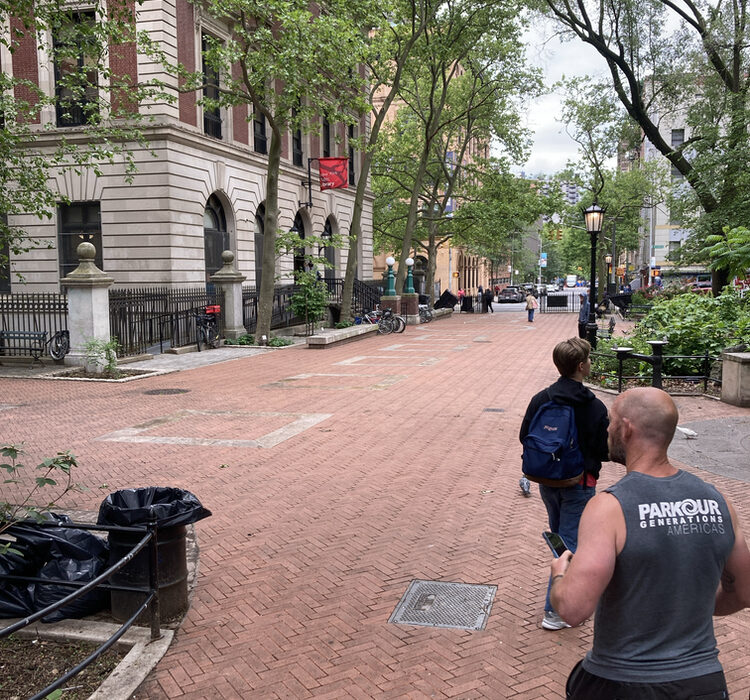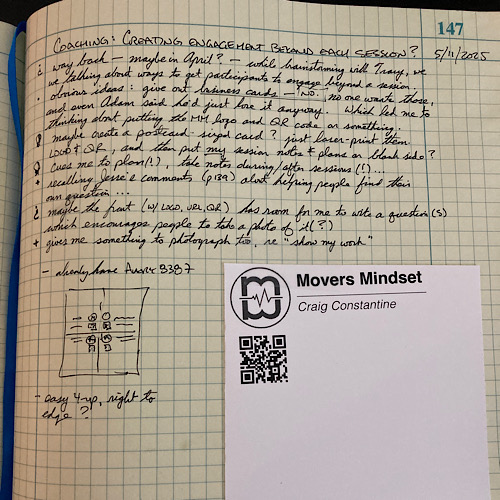The spot of the “QM Flow” session that I taught with Evan the weekend past at the Move NYC event. Sometimes I just take pictures where nothing is happening… yet.
ɕ

The spot of the “QM Flow” session that I taught with Evan the weekend past at the Move NYC event. Sometimes I just take pictures where nothing is happening… yet.
ɕ

I’ve been thinking about ways to get participants to engage after the session. I talked to a few experienced coaches about this, and there doesn’t seem to be a way that works well. Sure, after any session a few students might ask questions. But cultivating engagement beyond that is a big question—everyone I talked to said to tell them how to do it if I figure it out.
My first thought was to imagine something people could take a picture of. (Giving people things like business cards would be silly and wasteful.) Coaching in the context of Movers Mindset, I imagined a printed card with MM logo/name and QR to MM’s web site and lots of room for me to write. I imagined I could write a question on it; thinking it could be interesting enough to entice people to take a photo of it.
But further thinking led me to create this little card. It’s printed on some 4x postcard stock from Avery, where a full sheet is perforated to tear apart. In the phot you can see a little sketch showing how the printed parts are all arranged in the center of the full sheet, enabling printing very close to the final cards’ edges on the two sides that aren’t the actual printing margins.
My idea is that I’ll use these little cards for my notes as I’m preparing for a session. Then, any changes, problems, questions, etc. that come up are easily captured. This way I can close my personal loop of wanting to reflect afterwards into my more permanent notebooks.
And anyone who notices the card I’m holding, (referring to, writing on, stuffing in my pocket…) may want a photo of it. There we go! There’s no “please take a photo of this” pressure. Instead, if someone is interested, I have the perfect thing for them with some notes and details about the session and a QR to reach me. (The MM site has an email list and a contact form to reach me.)
ɕ
As I continue to think about coaching movement, I was recently reminded of this quote, added to my collection long ago:
I have just three things to teach: simplicity, patience, compassion. These three are your greatest treasures.
~ Lao Tzu
slip:4a104.
Those three words struck me as guides— both in the sense of what I want to convey, and how I want to coach.
For myself:
But also in terms of shaping others’ thinking:
ɕ
Most of the people that I work with do great work most of the time. (No, this is not about to turn into a back-handed compliment.) That means they make a few mistakes, or do a few things where I feel feedback would be helpful. Abitrarily, let’s say 90% of their work is good, and there’s 10% that I think could be improved.
…and so I start providing feedback on that 10%.
What does the other person experience? 100% negative feedback from me!
It doesn’t matter how good I might get at delivering great feedback, and helping them improve. If the only feedback I give is on the 10% of their work that I feel could be improved… ouch!
Instead, I need to think about the entirety of that person’s work. My feedback should be roughly in the same proportions as their work. This enables me to convey both the direct pieces of feedback and my assessment of the ratio in the whole. Continuing with the 90%/10% example, I should be giving vastly more positive reinforcement. That other person should be hearing vast amounts of positive feedback. This is not limited to people who work “for” you. This can be applied to everyone you have regular contact with and is relatd to my earlier post about, “if you see something, say something.”
There is a benefit for myself as well: If I’m only giving negative feedback, (focusing on that 10% as it were,) then it’s going to feel as if everything I encounter all day is negative. If I instead focus on increasing my ability to first notice that 90% of everything is great stuff, and then communicate that outwardly to the others, then it’s going to feel as if everything I encounter all day is positive. Since focusing on the negative stuff is one of my biggest problems, this is fertile ground indeed.
What’s your perception of what you encounter and does the feedback you give reflect that?
ɕ
There are two important takeaways from this idea. The first is that this is a sliding scale not a pair of absolutes. Almost everyone sits somewhere between. Secondly, by virtue of their position, teachers coaches and educators will always be experts. They have deep domain specific knowledge about an issue and understand it in a very different manner from the novice learners they are invariably teaching.
~ John “Hedge” Hall from, Novice and Expert Learners – The impossible rift
slip:4usono1.
I am not a parkour coach. But John most definitely is. He gave a wonderfully lucid and thought-provoking discussion at the last Art of Retreat which has left a permanent idea/mark/lesson in my mind about the “journey” each of us goes through in our learning process. (Just because I feel I learned the lesson, doesn’t mean I’m necessarily any good at passing it along.)
Anyway, John has a lot of really good thoughts on inclusivity in practice!
ɕ
In contrast, a transformational coach realizes the power of the coaching platform to inspire, motivate, and produce positive change in his or her followers. He or she is acutely mindful of the moral, social, emotional, and psychological needs of young people. Transformational coaches offer individual support and encouragement to each player and have a clear vision for the desired impact on their players’ lives. And not surprisingly, a transformational coach, even in organized athletics, allows and encourages young people to simply play.
~ Joe Ehrmann from, InSideOut Coaching
ɕ